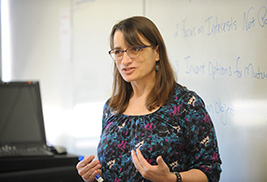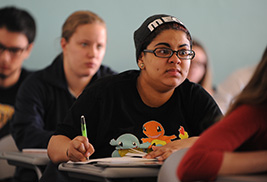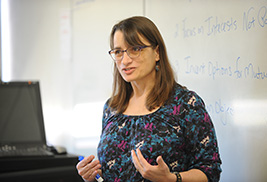Featured Article
Kent State Professor Challenges Students to Practice Awareness
Every semester, Karen Cunningham, an associate professor in Kent State’s Center for Applied Conflict Management, challenges her students to take lessons they learned in her conflict management classes and apply them to their daily lives – sometimes with dramatic results.
read moreKent State Professor Challenges Students to Practice Awareness
Posted April 20, 2015 | Haley Keding
Karen Cunningham, an associate professor in Kent
State University’s Center for Applied Conflict Management,
challenges her students to take lessons they learned in
her conflict management classes and apply them to their
daily lives.
Every semester, Karen Cunningham, an associate professor in Kent State University’s Center for Applied Conflict Management, challenges her students to take lessons they learned in her conflict management classes and apply them to their daily lives – sometimes with dramatic results. Cunningham shared her experience in Yes! Magazine.
Students in her Introduction to Conflict Management class develop a practical awareness to pay attention to their surroundings and consider the effect they have on others.
This semester, Cunningham’s assignment allows her students to create their own method of practicing awareness. She gave her students ideas for their essay topics, such as paying attention to conflict styles, limiting cell-phone usage and learning more about the people in their lives.
“We teach a lot of techniques in class, but sometimes students go through the techniques and don’t always internalize them,” Cunningham says. “Part of this practice helps people to see the importance of these techniques.”
In fall 2013, Cunningham tapped into Yes! Magazine’s quarterly essay competition for inspiration. The publication, focused on people who create positive change in the world, challenged students, as Cunningham says, to “notice and acknowledge people you don’t usually pay much attention to and observe their reactions.”
“It gave students a chance to connect with people,” Cunningham says. “You don’t really think about the fact that these people you walk by every day have their own stories and their own things they’re going through.”
Each semester, Cunningham chooses the top three essays from her class and submits them to Yes! Magazine as part of its quarterly competition. In previous years, one student was a finalist and two others had a portion of their essays chosen as Literary Gems on the magazine’s website.
Ray Stovall, senior environmental geology and applied conflict management major, had a selection of his essay about cyberbullying featured as a Literary Gem for fall 2014. To view an excerpt of Stovall’s essay, visit www.yesmagazine.org/for-teachers/writing-competition-essays/fall-2014/fall-2014-literary-gems.
“I didn’t expect that to go anywhere,” Stovall says. “I’ve never been a victim of bullying; but after writing that article, it brought me closer to understanding the feelings of the people who are bullied.”
Stovall also was a student in Cunningham’s Nonviolence: Theory and Practice course, which was more of a discussion format rather than a lecture. Stovall remembered his experiences in that class and says he learned valuable information through those discussions.
“There was a time when I didn’t think nonviolence worked,” Stovall says. “But during her class, she went step by step with the process and convinced me that is the only way to solve disputes.”

Students in Karen Cunningham's Introduction to Conflict
Management class develop a practical awareness to pay
attention to their surroundings and consider the effect they
have on others.
Ren Chicoye, senior applied conflict management major, also remembers her experiences with Cunningham.
“Karen Cunningham was always so open with the discussions we were able to have in her class,” Chicoye says. “The only time she really stopped us was when the class was actually ending.”
The students in Cunningham’s Nonviolence: Theory and Practice course also completed an “experience project,” which required them to join an organization that works to create positive change in the world.
“The assignment shows them what it’s like to actually try to make a difference and work with people who have similar goals but approach them differently,” Cunningham says.
One organization, Student Peace Alliance, came about when one of Cunningham’s students decided to create a new organization rather than join one that already existed. Chicoye started attending Student Peace Alliance and eventually worked her way up to becoming the president of the organization.
“At first I went for the grade; but then as I got more and more involved, I started to fall in love with it,” Chicoye says.
Through Student Peace Alliance, Chicoye says she learned to apply what she was learning in the classroom and is excited to see where the club goes in the future.
“There’s a sense of empowerment people get when they can say ‘I did this and it actually made a difference,’” Cunningham says. “It shows them they really have the power to actually do something and connect with people.”
Stovall says he is grateful for the skills he has learned while studying applied conflict management.
“The program as a whole gives students a certain amount of maturity,” Stovall says. “In order to proceed on a positive path, you have to forgive a lot of things. I think those courses and Cunningham’s class help us as individuals to mature and emotionally grow up.”
To learn more about Kent State’s Center for Applied Conflict Management, visit http://www2.kent.edu/cacm/index.cfm.
